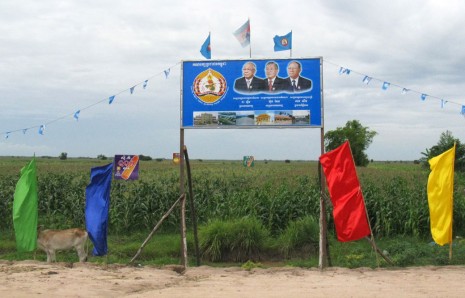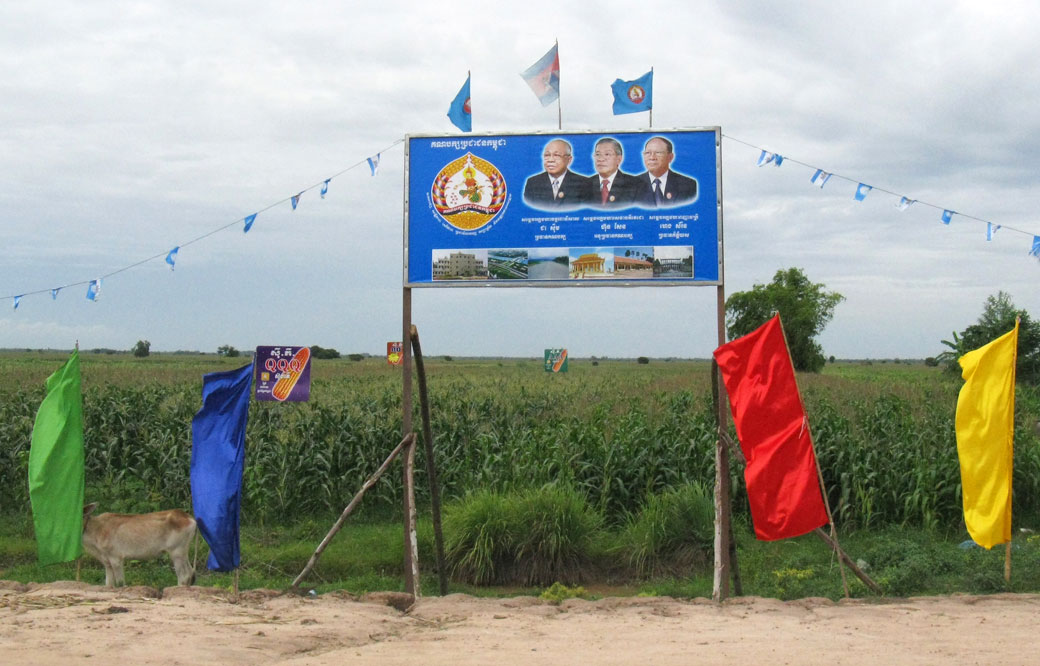PEAM CHOR DISTRICT, Prey Veng Province – The top CPP brass from Prey Veng province were gathered along the banks of the Mekong River on Tuesday morning as the rain started pouring down on this strip of land surrounded by sprawling corn plantations.
At 8:45 a.m., CPP lawmaker Cheam Yeap and his entourage showed up in a 15-meter-long speedboat, docked their vessel and shuffled over a slippery clay path to a stage that had been set up a few hundred meters away in front of the district office in rural Svay Phlos commune.

Taking the podium, Mr. Yeap, who served as governor of Prey Veng province under the communist People’s Republic of Kampuchea from 1981 to 1987, told of the CPP’s growth since democratic elections were first held in 1993.
“Now the Cambodian People’s Party has 470,000 members in Prey Veng province and 5.7 million members across the country,” he said.
Mr. Yeap, the head of the National Assembly’s Finance Commission, went on to tell the crowd that Prime Minister Hun Sen had personally promised 15 billion riel, or about $3.75 million, to complete construction of the main road running through the district, which is unpaved and virtually impassible during much of the rainy season.
He also promised that construction on the road linking Peam Chor district to the Vietnamese border would be completed by the end of 2014. Promises of road and irrigation system development, both much needed in Prey Veng’s agriculture-dependent economy, are at the center of the CPP’s platform for the upcoming national election.
But when asked after his speech why the CPP remained so popular in the province, Mr. Yeap said it was the “structure” of the party—not promises of improved infrastructure—that ensured continued CPP domination at the polls.
“I think the majority of the people like the CPP because we have a structure at provincial, district, commune and village levels,” he said, adding that the CPP had working groups, composed of three party members tasked with canvassing their neighbors, in all 1,167 villages in Prey Veng.
The CPP’s party structure, which effectively parallels that of the country’s government, has created a situation in which the electorate is heavily dependent on the party apparatus for government services and, according to voters and election monitors, under intense pressure to support the ruling party.
Kry San, 64, has been the commune chief in Svay Phlos for some 30 years. Like the other 1,633 commune chiefs in Cambodia—97 percent of whom are ruling party officials—he has the authority to appoint village chiefs.
Mr. San is also part of the CPP’s commune working group. The purpose of commune and village working groups, he explains, is to spread information about the party and respond to the problems facing their constituency.
“We spread our message so that villagers understand the policy of the Cambodian People’s Party and they also participate with us,” he said, adding that the CPP steps in when his constituency is in trouble.
“When villagers meet disasters such as flooding and storms, there is only the Cambodian People’s Party that always comes quickly to help the people,” he said.
This dual function of local officials serving as local party leaders has bolstered the CPP at the expense of public institutions by creating the perception that the party, rather than the government, is providing necessary services, said Koul Panha, executive director of the Committee for Free and Fair Elections in Cambodia.
“They [the CPP] try to create a combination between [government] authorities and parallel structure with the CPP. They try to reduce the existing authority structure at all levels to become a CPP working group,” he added.
“It makes people very confused. They don’t know what is coming from CPP or the government…. It creates a lot of problems at the local level, especially for the non-CPP supporters,” he said, adding that commune and village chiefs have the authority over everything from administrative contracts such as land transactions to marriage licenses and voter lists.
Mr. San said that neither he nor his village chiefs favor CPP supporters over members of the opposition, but according to a number of villagers in the area, the role of local officials as party activists made it problematic to openly support the opposition.
Compared with CPP signs and flyers, which are posted on almost every house along the dirt roads that link villages in Svay Phlos commune, even subtle signs of Cambodian National Rescue Party (CNRP) support are rare. But in front of Ath Khna’s house stands a 3-meter-tall bamboo frame supporting a large wooden sign painted with the CNRP’s rising sun logo.
Mr. Khna, a 45-year-old farmer, said that when the CPP rushes to help people in his village during storms and floods, his modest wooden home is passed over because of his open affiliation with the opposition party.
“For those of us who outwardly support the opposition party, we never receive donations from local officials when we face a disaster, even though we are just as poor,” he said, adding that groups such as the Cambodian Red Cross “gave donations only to the people who support [the CPP].”
Cheng Kuong, 37, who is part of the CPP working group in Bang’Ek village, where Mr. Khna lives, denied that any preference was given to CPP supporters, but said she is heavily involved with the ruling party “because [the CPP] builds roads, schools and hospitals for us.”
CPP signs are plastered on the trees around Chhem Leap’s property and on the polls supporting his house. But the 39-year-old farmer says he didn’t put them there.
“I am not sure that all of these villagers really support the Cambodian People’s Party, but we let the local officials put up these signs because we don’t want to argue with them,” he said.
He added that he worried he would miss out on the benefits of being friendly with local officials if he didn’t show his support for the ruling party. “We are staying quiet. But when election day comes, we can vote for whoever we want,” he said.




